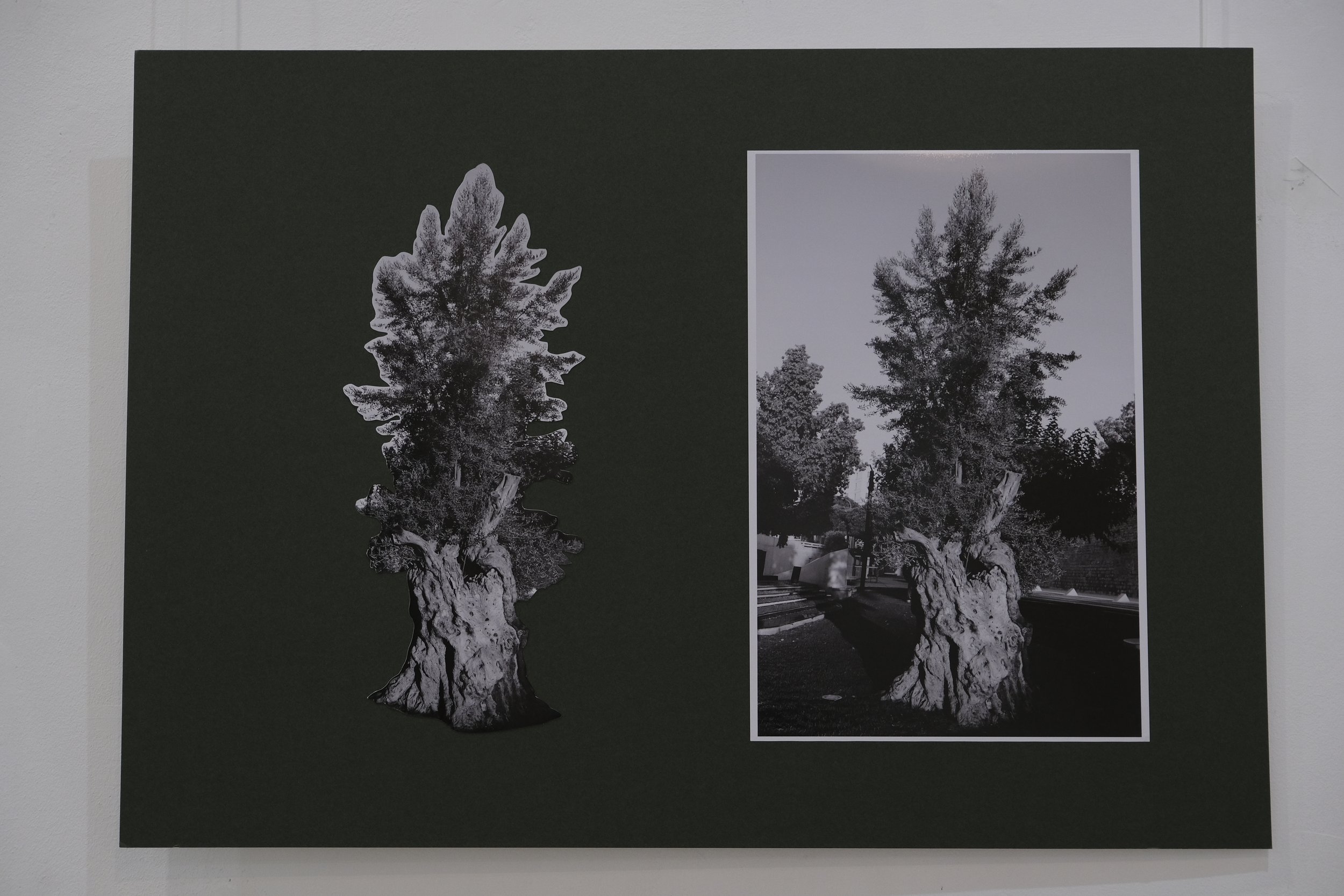The Disrupted Garden
Multimedia project / 2024
By doing a performative gesture of destroying the depicted olive garden by the copper-painted hands, I am showing the beginning of the complex colonial narrative of Cyprus. Breaking through the idealistic image of nature, I point out the role of copper mining, which, as started to be led by British imperial ambitions, became the reason for the following environmental crisis.
This theatre-like short act is allowing the path to the rest of the works created within the (Re)Grounding research on the politics of extraction, migration and climate crisis.
Now and Then / Photography, film soup, collage
I love to work with the subject of destruction in my art practice, applying damage to my own ouvre, manipulating with my negatives or prints but having no control on the final result. This way of symbolic expression seems appropriate to me, while speaking of such things, as colonialism, war and exploitation of nature.
As you can see in these photos, there are almost no trees or plants in the former copper extraction areas. I collected some copper dust in Lefke and applied it to soak afterwards my film photographs of these dried out, exhausted post-mining landscapes. You can see the different results of how this "copper soup" affected the images. I have experimented with the time length of soaking prints, with the photo paper qualities, and, to compare, I also partly used the copper sulphate brought from Ukraine. I also was lucky to get an old Turkish Cypriot magazine and find there b/w photos of the same areas in the 1950s, so I put them to the board as well, to have a visual understanding of changes. Interesting, that olive trees are still growing around, but definitely not where the copper mining was going on.
An old olive tree story / Photography
If the olive tree can make it home, maybe so can I?
This work is a reflection on the notion of home, roots and displacement, the subjects that Cyprus and Ukraine are sharing for long history.
When I looked at this tree first, while knowing that the whole area of the park was completely cleaned for the Eleftheria square construction, I started to believe that this tree was artificially brought there. Once again it reminded me that I am an internally displaced person who lost both homes, in Donetsk and in Crimea. I thought I found a companion in misfortune, who lost their home in a way I do, and was forced to start living in a new place.
The Common Ground / Analog photography, participatory installation
The photo is taken in Lefke, an abandoned copper mining area, and depicts the bed of a dried out lake. This participatory work invites visitors to assemble the image’s pieces together.
The residence itself is called “ReGrounding”, and in Cyprus I often heard about reuniting the divided island. So I offer a metaphorical way to "construct" the common ground for the Cypriot audience: along with the environmental issues there is a cultural and political challenge.
Exploring Cyprus' colonial past and ambivalent present, division of their society according to the ethnic-religious aspects, its language and education history, I am interested in continuing this research. Especially from the perspective of the Ukrainian born in Donetsk, who was seeing the impact of culture and language on the region's life and continues to experience the homeland's occupation
But I wouldn't be so eager to share this story with you if it was that hopeless.
Later, I got to know the whole story from the Department of Gardens of Nicosia Municipality: this tree grew exactly in this area. Until there was a decision to build a park, it was taken away with the other plants. As the construction was finished, the tree was brought and planted back. Currently the old olive has sprouted new branches, and the tree continues to bring fruits. As it turned out, the olive tree is at home now. So, if the olive tree can make it home, maybe so can I?








